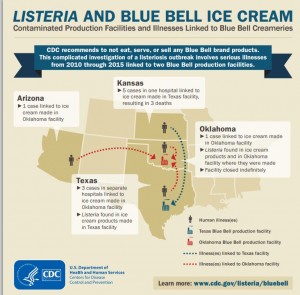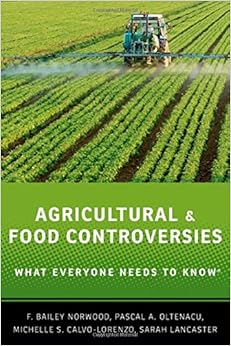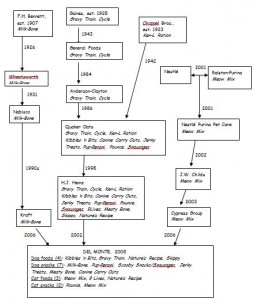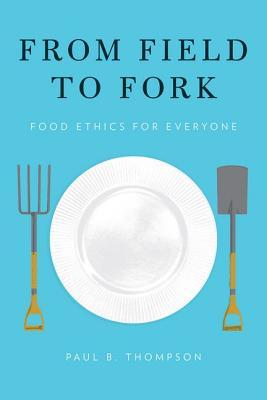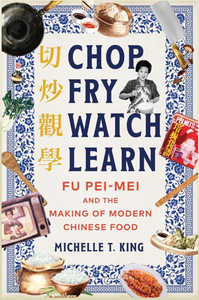Every time I collect five, I’m posting studies sponsored by food companies or trade associations that show benefits of the sponsor’s products.
I would love to be able to post industry-sponsored studies with results contrary to the sponsor’s interest, but I’m just not finding any. If you run across some, please send.
Here’s this week’s batch, with comments on the last two:
Probiotic supplementation prevents high-fat, overfeeding-induced insulin resistance in human subjects. Carl J. Hulston, Amelia A. Churnside and Michelle C. Venables British Journal of Nutrition (2015), 113, 596–602 doi:10.1017/S0007114514004097.
- Conclusion: These results suggest that probiotic supplementation may be useful in the prevention of diet-induced metabolic diseases such as type 2 diabetes.
- Sponsor: The present study…was financially supported by industry funds. The cost of consumables for the study was covered by an educational grant from Yakult UK Limited.
Dairy Foods and Dairy Proteins in the Management of Type 2 Diabetes: A Systematic Review of the Clinical Evidence. Gonca Pasin and Kevin B Comerford. Adv Nutr 2015; 6:245-259. doi:10.3945/an.114.007690.
- Conclusion: Given cultured dairy products’ long history of safe use, and whey protein’s overall efficacy in clinical studies so far, these dairy products appear to have great potential to assist with the management of T2DM in millions of people worldwide, in an inexpensive and easily implementable manner.
- Sponsor: California Dairy Research Foundation. G Pasin is the executive director of the California Dairy Research Foundation. KB Comerford is a paid consultant for the California Dairy Research Foundation.
One Egg per Day Improves Inflammation when Compared to an Oatmeal-Based Breakfast without Increasing Other Cardiometabolic Risk Factors in Diabetic Patients. Martha Nydia Ballesteros , Fabrizio Valenzuela, Alma E. Robles, Elizabeth Artalejo, David Aguilar, Catherine J. Andersen, Herlindo Valdez and Maria Luz Fernandez. Nutrients 2015, 7(5), 3449-3463; doi:10.3390/nu7053449
- Conclusions: When compared to an oatmeal breakfast, one egg per day did not result in changes in plasma glucose, our primary end point…[and other markers] indicating that eggs can be consumed without any detrimental changes in lipoprotein or glucose metabolism in this population. The most interesting finding, however, was that eggs—possibly due to their content of highly bioavailable lutein and zeaxanthin—reduced inflammation in diabetic subjects when compared to oatmeal intake.
- Sponsor: Egg Nutrition Center
The Acute Electrocortical and Blood Pressure Effects of Chocolate. M. Montopoli, L. C. Stevens, C. Smith, G. Montopoli, S. Passino, S, Brown, L. Camou, K. Carson, S. Maaske, K. Knights, W. Gibson, J. Wu. NeuroRegulation 2015;2(1):3-28. doi: 10.15540/nr.2.1.3.
- Conclusions: This is the first known study to investigate acute EEG effects of consuming chocolate and suggests a potential attention-enhancing effect… there is clearly the possibility of an application of this combination of L-theanine and cacao in the treatment of hypertension.
- Sponsor: “Chocolate products for this study were provided by a generous grant in supplies from The Hershey Company…Grateful appreciation is expressed to Dr. Debra Miller and to the staff at The Hershey Company for their guidance and support throughout this project and for their careful review of this manuscript prior to submission.”
Comment: I learned about this study from FoodNavigator, which deserves highest praise for this headline: “Step aside energy drinks: Chocolate has a stimulating effect on human brains, says Hershey-backed study.” Bravo!
Efficacy and safety of LDL-lowering therapy among men and women: meta-analysis of individual data from 174 000 participants in 27 randomised trials. Cholesterol Treatment Trialists’ (CTT) Collaboration. Lancet 2015:385:1397-1405.
- Conclusion: “In men and women at an equivalent risk of cardiovascular disease, statin therapy is of similar effectiveness for the prevention of major vascular events.”
- Conflicts reported: The CTT Collaboration reports funding by various British and Australian research councils and foundations, “and not by the pharmaceutical industry.” But, it says, most of trials covered by its analysis were supported by the drug industry, and numerous members of the CTT report fees, grants, consultancies, or honoraria from various companies making cholesterol-lowering drugs.
Note: drug companies have a vested interest in promoting drug, rather than dietary, approaches to LDL-lowering.
Comment: Conflicts of interest do not necessarily mean that the results of the study were manipulated or wrong. They do mean that the methods and results require more than the usual level of scrutiny. Sponsored studies almost invariably produce results consistent with the sponsor’s economic or marketing interests.
It’s likely that some industry-sponsored studies produce conclusions contrary to the sponsor’s interest. If you know of any, please send.

